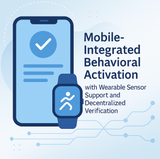Screen Time and Its Effects on Health: Balancing Technology Usage for Well-being
In today's digital era, screens have become an integral part of our lives. From smartphones and tablets to computers and televisions, we rely heavily on technology for communication, entertainment, and work. However, excessive screen time can have significant impacts on our health and well-being. In this blog post, we will explore the effects of screen time on our physical and mental health and discuss strategies for finding a balance that promotes overall well-being.
The Physical Effects of Excessive Screen Time: Spending prolonged hours in front of screens can take a toll on our physical health. Here are a few key effects to consider:
a. Sedentary Lifestyle: Excessive screen time often leads to a more sedentary lifestyle, contributing to weight gain, obesity, and associated health issues.
b. Eye Strain and Vision Problems: Staring at screens for extended periods can cause eye strain, dry eyes, blurred vision, and even digital eye fatigue syndrome.
c. Sleep Disruptions: The blue light emitted by screens can interfere with our natural sleep cycles, making it harder to fall asleep and leading to sleep disorders.
The Impact on Mental Well-being: Excessive screen time can also have negative consequences for our mental health:
a. Increased Stress and Anxiety: Constant exposure to social media and online information overload can lead to heightened stress levels and anxiety.
b. Social Isolation and Relationship Challenges: Spending excessive time on screens can reduce face-to-face interactions, leading to social isolation and difficulties in building and maintaining relationships.
c. Decreased Attention Span and Cognitive Function: Frequent multitasking and constant exposure to digital stimuli can hinder our ability to concentrate, leading to decreased attention span and cognitive performance.
Strategies for Balancing Screen Time and Well-being: Finding a healthy balance between technology use and overall well-being is crucial. Here are some tips to help you manage your screen time effectively:
a. Set Screen Time Limits: Determine specific time limits for screen usage each day and stick to them. Use smartphone apps or built-in features to monitor and control your usage.
b. Practice Digital Detox: Take regular breaks from screens, especially before bed, to give your eyes and mind a chance to rest.
c. Engage in Physical Activity: Incorporate regular physical activity into your daily routine to counterbalance sedentary screen time and promote overall health.
d. Cultivate Offline Hobbies and Interests: Discover activities that don't involve screens, such as reading, outdoor pursuits, hobbies, or spending quality time with loved ones.
e. Establish Tech-Free Zones and Times: Designate specific areas or periods in your home or day where technology use is off-limits, allowing you to focus on other activities or relationships.
f. Practice Mindfulness: Be mindful of your screen time habits and consciously choose when and how you engage with technology. Practice being present in the moment and limit mindless scrolling.
While screens and technology offer numerous benefits and conveniences, it's essential to be mindful of the potential negative effects of excessive screen time on our health and well-being. By finding a balance that promotes physical activity, mental well-being, and meaningful offline connections, we can harness the power of technology while also prioritizing our overall health. Let's embrace technology as a tool for enrichment rather than allowing it to control our lives.
Truway Health News & Insights
Consistency Over Intensity: How to Make Wellness Stick
Consistency Over Intensity: How to Make Wellness Stick Wellness and self-care goals often start with...
Mobile‑Integrated Behavioral Activation With Wearable Sensor Support and Decentralized Verification: Protocol for a Randomized Behavioral Trial
Abstract Background: Behavioral activation delivered through mobile platforms has shown promise for...
When Your Body Won’t Settle Down Everyday Habits That Calm Inflammation
When Your Body Won’t Settle Down: Everyday Habits That Calm Inflammation Inflammation is a normal bi...
Truway Health Launches Innovative In-Vitro Cryo-Therapeutic Clinical Study
Advancing Cellular Preservation, Precision Therapy, and Translational Science Truway Health, Inc. is...
Everyday Stress, Handled: Practical Ways to Feel More Steady Day to Day
Everyday Stress, Handled: Practical Ways to Feel More Steady Day to Day Everyday stress is the mind-...
Creating Your Personalized Health Roadmap: Break Bad Habits and Build Long-Term Well-Being
Creating Your Personalized Health Roadmap: Break Bad Habits and Build Long-Term Well-Being Improving...







